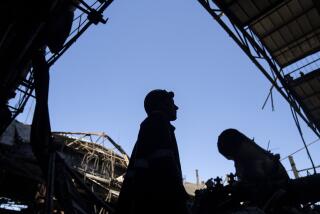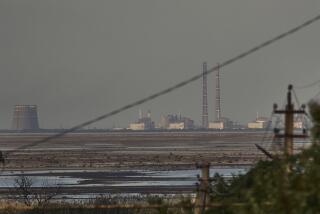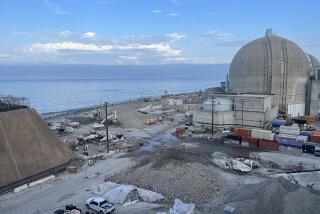Soviets Scrap 6 Nuclear Power Plant Projects
- Share via
MOSCOW — The Soviet Union has scrapped six nuclear power projects because of earthquake danger or tougher standards imposed after the Chernobyl accident, a top Soviet official said Friday.
Although official media have reported the cancellation of several projects because of growing public opposition, the list provided by Minister of Atomic Power Nikolai F. Lukonin was the first comprehensive report on the state of the Soviet nuclear power industry.
Cancellations were “partly due to highly seismic areas, and the second reason was changes in regulations and norms of building power plants,” Lukonin told reporters at a news conference.
He said projects had been canceled in Azerbaijan, Minsk in Byelorussia, Odessa and Krasnodar, and that additional units to existing plants in Armenia and Georgia had been scrapped. Those projects had a combined capacity of 28 million kilowatt hours.
Work Suspended in Lithuania
Work was also temporarily suspended on a reactor in the Baltic republic of Lithuania because of public concern about possible environmental damage to a lake and earthquake danger, Lukonin said.
Concern among nuclear officials over earthquake-prone areas was heightened following the devastating Dec. 7 temblor in Armenia that killed at least 55,000 people. The nuclear plant located near Yerevan, the Armenian capital, is built on a geological fault but was undamaged. However, Premier Nikolai I. Ryzhkov has said that the plant will be closed in two years because of the danger of future quakes.
The Georgia, Azerbaijan and Krasnodar sites also are located in the Caucasus Mountain region of the southern Soviet Union.
The Soviet Union has 16 nuclear power plants containing 45 reactors that currently produce 12.7% of the country’s electricity. Officials now are looking for new sites in more stable areas, Lukonin said.
Construction Continuing
Despite the cancellations, planning and construction is continuing at 15 other sites, and it is “impossible” to develop the Soviet economy without further reliance on nuclear power, Lukonin said.
Soviet officials have acknowledged a fear of nuclear power among citizens since the April, 1986, Chernobyl accident in the northern Ukraine that killed at least 31 people and released a cloud of radiation.
Lukonin said fears of nuclear power were a major reason officials imposed stricter siting and construction requirements after the Chernobyl accident.
A team of International Atomic Energy Agency officials recently completed a three-week inspection of a nuclear power plant in Rovno, a city in the western Ukraine--marking the first international inspection of a Soviet nuclear plant, he added.
The officials said they were impressed with its safety features and staff, but that manufacturers had supplied poor quality equipment that needed modification before it was used.
“We have to work more closely with the public. We have had certain misunderstandings with that in the past,” Lukonin said.
More to Read
Sign up for Essential California
The most important California stories and recommendations in your inbox every morning.
You may occasionally receive promotional content from the Los Angeles Times.










